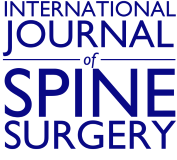Abstract
Background The effect of preoperative mental health on outcomes after anterior cervical discectomy and fusion (ACDF) is of increasing interest. The purpose of this study was to utilize patient-reported outcome measures (PROMs) to compare outcomes after ACDF in patients with and without poor mental health. We hypothesized that patients with worse baseline mental health would report worse outcomes after surgery.
Methods Patients undergoing ACDF for degenerative cervical spondylosis with at least 12 months of follow-up were included. Outcomes collected before and after surgery included the RAND-36, Neck Disability Index (NDI), EuroQol 5-dimension (EQ-5D), and Single Assessment Numeric Evaluation (SANE) score.
Results Seventy-one patients were included and assigned to the depression or nondepression group based on baseline mental health. The depression group had worse baseline preoperative scores across all PROMs: NDI (44.2 vs 36.8, P = 0.05), RAND (1511.4 vs 2198.18, P < 0.001), EQ-5D (12.55 vs 10.14, P < 0.001), and SANE (56.3 vs 72.9, P < 0.001). Postoperatively, the depression group had worse scores at the final follow-up for RAND (2242.8 vs 2662.2, P = 0.03) and SANE (71.5 vs 80.8, P = 0.02). Both groups experienced improvements with ACDF across all PROMs. The changes in each PROM were not statistically significant between groups. There were no statistically significant differences in the percentage of patients achieving the minimal clinically important difference across PROMs.
Conclusion This study is the first to utilize the RAND-36, EQ-5D, NDI, and SANE scores to assess preoperative mental health and its effect on postoperative outcomes after ACDF. While poor preoperative mental health status yielded significantly worse baseline and postoperative outcomes scores, patients experienced significant improvement in symptoms after ACDF.
Level of Evidence 2.
Clinical Relevance Clinicians should be aware of the effects of poor mental health status on clinical outcomes in patients undergoing anterior cervical fusion, but can still expect significant clinical improvements after surgery.
Footnotes
Funding The author(s) received no financial support for the research, authorship, and/or publication of this article.
Declaration of Conflicting Interests The following authors have the following interests to disclose: Ahmad Nassr: Receives fellowship and research funding from AO Spine North America, research funding from Pfizer, and research funding from Premia Spine. Benjamin Elder: Consultant for Johnson & Johnson and is on the Medical Advisory Board for InjectSense. Melvin Helgeson, Scott Wagner, and Donald Colantonio are employees of the United States government. Drs. Mohamad Bydon, Brett Freedman, Christopher Kepler, and Arjun Sebastian have no interests to disclose.
Disclosure The authors report no financial disclosures related to this article.
- This manuscript is generously published free of charge by ISASS, the International Society for the Advancement of Spine Surgery. Copyright © 2022 ISASS. To see more or order reprints or permissions, see http://ijssurgery.com.






